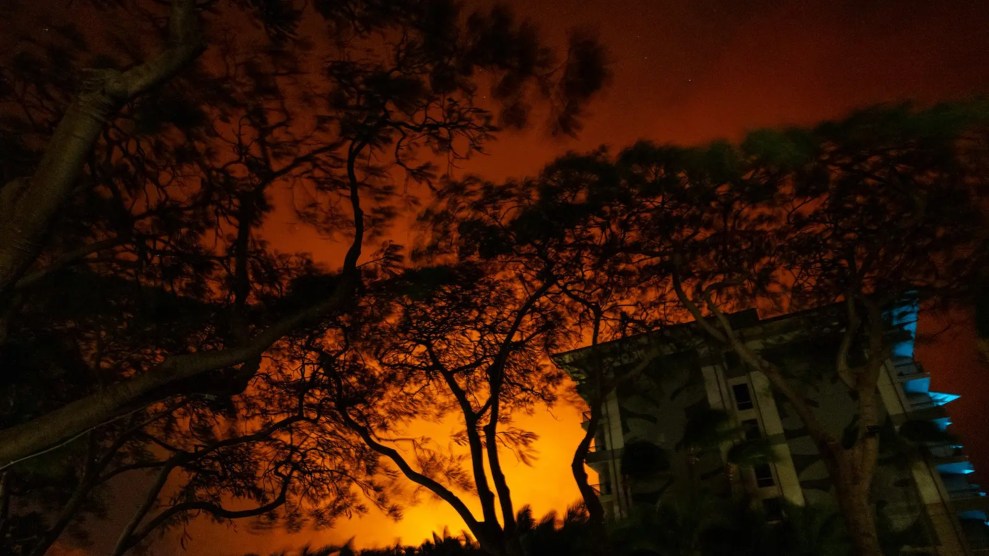Mother Jones: In your opinion, when should we begin withdrawing troops from Iraq?
General Wesley Clark: We should begin to withdraw by bringing home two brigades by the end of 2007.
MJ: What is a reasonable time frame for withdrawal, assuming the decision to withdraw has been made? I’ve heard some think tankers say 9 to 12 months, but the military often cites 2 years. Presidential candidate Bill Richardson thinks it can be done in 6 months.
WC: The timeline should not be fixed. We should use withdrawal as bargaining leverage at the diplomatic and political levels inside Iraq. I would anticipate some troops there for some time.
MJ: And would this mean a withdrawal to Kuwait? Is there any other possible route?
WC: We might continue to base troops in Kuwait. This depends on the overall situation in the region. In the near term, certainly, we will continue to have troops in Kuwait.
MJ: Let’s talk about the situation inside Iraq after the United States leaves. Assuming we pull out over the course of a year, or even two, in your mind what happens with the political situation? How will power shift?
WC: A near-term pullout will leave a power vacuum, which is likely to result in more open warfare between the factions and more direct involvement by regional powers. It will certainly impact trade and commerce in the region, at least in the near term, and will result in the withdrawal of 1 to 2 million barrels per day of Iraqi crude oil from the world oil markets—more if Iran and the Saudis engage directly in the conflict—and probably raise the price of gasoline and heating oil in the United States, as well as resulting in some degree of cost inflation in many economic sectors. Ultimately, the Shiites will probably control much or all of Iraq, and Iraq’s policy will tilt pronouncedly to favor Iran.
MJ: What happens to Nouri al-Maliki after a U.S. withdrawal, assuming he’s still prime minister at that time?
WC: Maliki is just a figurehead who will work to find allies wherever he can, most probably Iraq and Syria. But he will have to fight Moqtada al-Sadr as well as the SCIRI [Supreme Council for Islamic Revolution in Iraq] militia to really gain control.
MJ: Which of Iraq’s neighbors will try to fill the power vacuum after a U.S. withdrawal and what happens to Al Qaeda and Al Qaeda in Iraq?
WC: Iran is well positioned to take control of most if not all of Iraq through support of a client government. Iran will support all Shiite factions, and perhaps some Sunnis, playing one off against another, and against the Saudis in pursuit of its goal. Ultimately what is likely to emerge is an Iraqi leader who is acceptable to and aligned with Iran but not totally subservient to its every wish. Al Qaeda will try to become a Sunni resistance force, but is capable of reinforcing Iranian efforts in pursuit of common goals, like destruction of the Saudi monarchy, or attacks against Israel and the West.
MJ: Do you think we’ll leave troops in Kurdistan?
WC: We will probably retain some presence in Kurdistan, but only enough troops to dissuade Turkish intervention there.
MJ: In terms of equipment and infrastructure, what are we going to take with us and what are we going to leave?
WC: Don’t worry about the logistics. We’ll make the logistics work for any sensible plan. The logistics is the easy part.
MJ: What happens to prisoners held in U.S.-controlled detention centers?
WC: The hard part is how to get out without destroying the U.S.’ reputation and influence around the world, and especially in that vital region; how to help those Iraqis who helped us; and how to insulate the region from the instability that might spill over from Iraq. Prisoners in detention centers will either be released or turned over to Iraqi control.
MJ: In the event of a withdrawal, what happens to the Iraqis who have worked with U.S. forces as translators, fixers, and drivers?
WC: If we depart relatively quickly and without a political and diplomatic arrangement in the region and inside Iraq that will generate common interests and suppress conflict, then yes, all these difficult questions come to the fore: the translators, the investment in bases, re-intervening to deal with a humanitarian crisis—but I’m not advocating that course of action. This is not Vietnam, where a lot of bad things did happen, but they were mostly isolated within the region. This would be far more damaging for the U.S. around the world were we simply to let logistics and fear of casualties drive the pullout. We shouldn’t do that.















